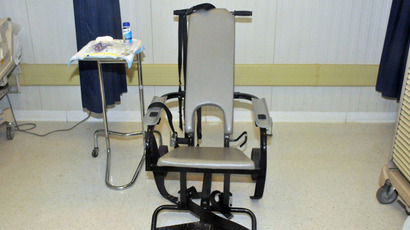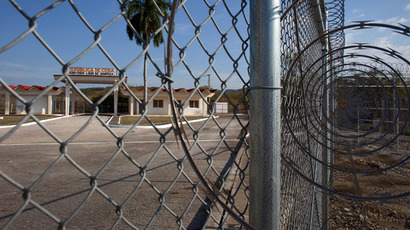Guantanamo an ideal recruitment tool for terrorists - UN human rights chief
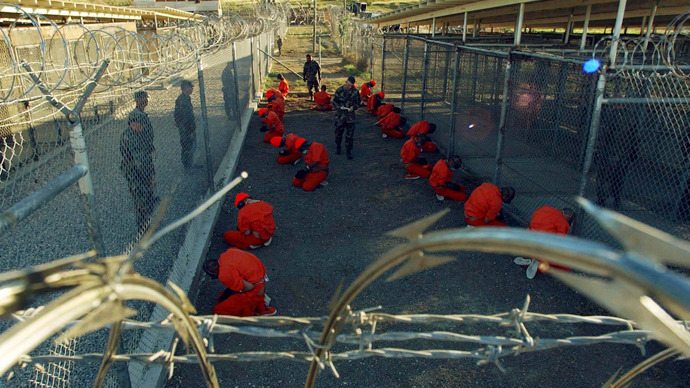
UN human rights chief Navi Pillay has scolded the US for failing to close Guantanamo prison, warning it “has become an ideal recruitment tool for terrorists.” Pillay also cautioned that curtailing freedoms to fight terror will only worsen the problem.
Speaking at the opening of the spring session of the UN's Human
Rights Council, Pillay accused the Obama administration of human
rights violations, pointing to the infamous Guantanamo Bay
detention center in Cuba as an "example of the struggle
against terrorism failing to uphold human rights, among them the
right to a fair trial," Reuters reports.
Follow
RT’s day-by-day timeline of the Gitmo hunger strike
A reported 103 inmates are participating in the ongoing hunger
strike at Guantanamo, 30 of whom are still being force-fed.
Force-feeding is an extremely invasive and
highly controversial practice, which many human rights activists
– and the UN – consider to torture.
According to Kuwaiti-born detainee Fayiz al-Kandari, the nasal
tubes used for force-feeding are large, painful and have
hazardous side effects: "It takes several attempts to get the
tube into the right place,” his lawyer Carlos Warner told RT.
“Once it goes down his throat he has a difficult time
breathing. There’s a gag reflex.”
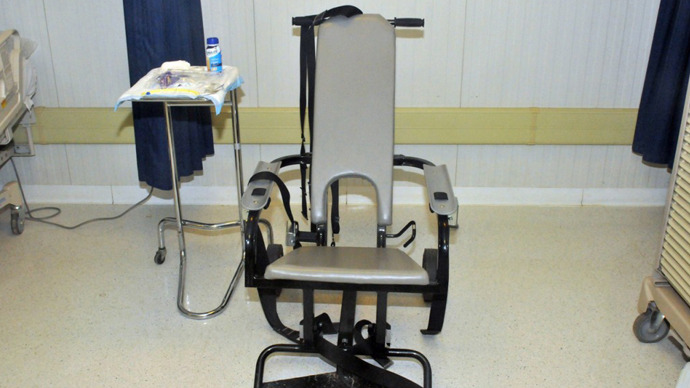
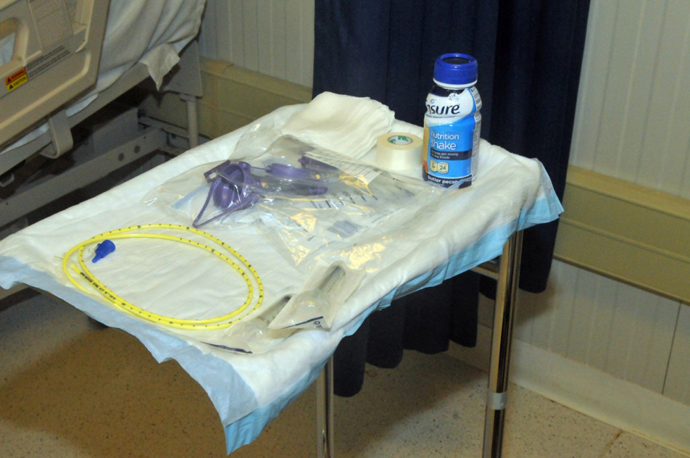
Witnesses have claimed that Guantanamo guards used sexual assault as an interrogation technique to extract information from Muslim inmates.
“The torture and information extraction methods that we used certainly created a great deal of doubt and questions in my mind to whether or not this was my America,” Terry Holdbrooks, a former guard at the camp said in an interview with RT.
There have also been incidents where guards used force unprovoked against detainees. Ramzi Kassem, the lawyer for Moath al Alawi, said that guards shot five rubber bullets at his client for no discernible reason.
Many of the 166 detainees have been held for more than a decade without charge, and their continued detention amounted to “arbitrary detention in breach of international law,” Pillay said, reiterating her earlier accusations against the Obama administration.
"We must be clear about this: The United States is in clear
breach not just of its own commitments but also of international
laws and standards that it is obliged to uphold," she said in
April.
US President Barack Obama vowed to close Guantanamo in 2009, at the
outset of his first term in office. However, he was blocked from
fulfilling that promise by legislation passed by the US Congress.
However, in a speech on May 23 this year Obama indicated his
willingness to resume prisoner transfers from Guantanamo Bay, but
offered few details on the planned changes and when they would be
implemented.
In his speech, Obama urged lawmakers in Washington to enact his
proposals immediately: “I have tried to close GTMO. I
transferred 67 detainees to other countries before Congress
imposed restrictions to effectively prevent us from either
transferring detainees to other countries, or imprisoning them in
the United States. These restrictions make no sense.”

Counter-terror policies stoke terrorism, not prevent it
The military prison at Guantanamo Bay was opened by the
administration of former President George W. Bush following the
September 11, 2001, terror attacks in the US. It eventually
emerged that measures designed to tighten security at the prison
led to abuses of power and human rights violations.
Concerns about the effectiveness of current counter-terror
policies were raised in the past week after attacks against
soldiers in London and Paris – the London slaying of 25-year-old
Lee Rigby by two men was apparently in retaliation for UK
military involvement in Muslim countries.
UN human rights chief Pillay likewise warned against excessive
“counter-terrorist and counter-insurgency operations,”
saying that she had received allegations of "very grave
violations of human rights… Such practices are self-defeating.
Measures that violate human rights do not uproot terrorism, they
nurture it."
Her statement comes amid mounting calls in both France and the UK
to toughen anti-terror measures following recent attacks in both
capitals. In London, an off-duty soldier was killed and beheaded
by two men, and an off-duty soldier in Paris was stabbed in a
separate attack. Pillay did not refer to either case in her
remarks.

Following the Woolwich murder, debates over the bill widely
known as the ‘Snooper’s Charter’ has reappeared in the UK
along with calls for tighter controls on extremist groups.
UK Home Secretary Theresa May said on Sunday that it was
“essential” to grant intelligence agencies the capacity to
access communications and data collections by Internet service
providers, including details of individuals' web browsing
history, social media messages and internet gaming, storing them
all for 12 months, despite overwhelming opposition to the Draft
Communications Data Bill.
However, such practices implemented in the US failed to secure
the country from acts of terrorism.
Not only being ineffective, they also cost the US budget
over $700 billion since 9/11. This, however, did not help to
prevent the Boston Marathon bombing.
“I believe this was a massive failure of the surveillance
state that we’ve created in America,” American lawyer
Jesselyn Radack told RT. “Since 9/11 we spent over $700
billion on national security and a lot of that is surveillance
with video cameras, with massive data collection, with fusion
centers, and none of those helped to deter or detect any
terrorist plot. And while the surveillance video was useful in
reconstructing what happened it didn’t prevent it.”













